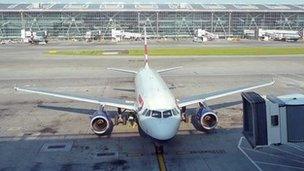Wind direction contributes to Heathrow aircraft noise
- Published
Complaints rose substantially over the summer, peaking at nearly 1,800 in August
Wind direction has been blamed for soaring numbers of complaints about aircraft noise at Heathrow.
They rose substantially over the summer, peaking at nearly 1,800 in August this year, compared with 400 in August 2011.
Hammersmith and Fulham Council claimed airport bosses had told a public meeting that the rise was due to "the wrong kind of wind".
Heathrow said wind direction was "a valid contributing factor".
Complaints about noise rose from under 400 in September 2011 to over 1,600 in September 2012, and from just over 400 in October 2011 to nearly 1,500 in October 2012.
Heathrow representatives explained how a new system, which includes changing the use of the departures runway, would affect residents in Hammersmith and Fulham at a meeting at Hammersmith Town Hall last week.
Hammersmith and Fulham Council said that councillors at the meeting had said they suspected the rise could be due to the relaxation of runway rules under the trial.
'Contributing factor'
Phase two of the Operational Freedoms trial started in July this year, testing landing aircraft on the airport's designated departures runway, and redirecting departing aircraft from southerly departure routes.
A Heathrow spokeswoman said: "We explained that an increased experience of noise over the summer could be due to several factors.

Noise complaints rose substantially during the summer
"Whilst wind direction was one of those factors, we did not suggest in any way that this was the only explanation."
The spokeswoman added that wind direction was "a valid contributing factor" to noise.
She explained: "For safety reasons aircraft take off and land heading into the wind.
"Because the wind has been in a westerly direction on 89% of days between July and September - compared to an average of 66% in the three months before - it means aircraft have been flying over Hammersmith and Fulham more frequently this summer than usual."
The spokeswoman said other contributing factors included adverse weather conditions, and more westerly operations since the start of phase two of the trial.
Meanwhile, the London mayor earlier took his case for a "Boris Island" airport in the Thames Estuary to Sir Howard Davies, who is charged with reviewing government aviation capacity policy.
Boris Johnson also stated his opposition to a third runway at Heathrow.
Sir Howard heads a government-appointed commission which will make recommendations about future airport capacity needs.
- Published13 November 2012
- Published4 November 2012
- Published3 November 2012
- Published2 November 2012